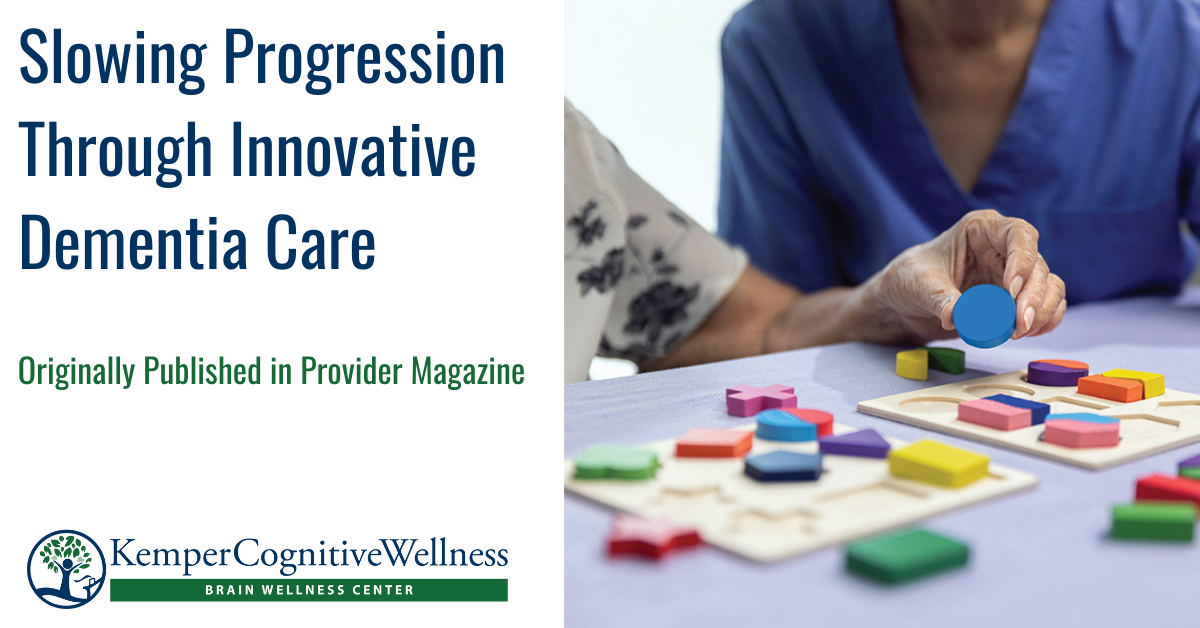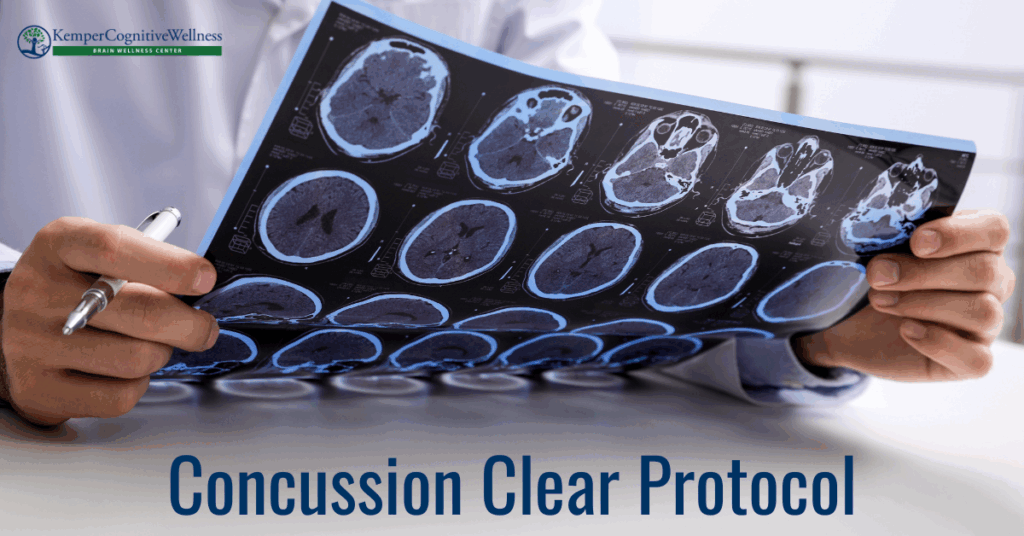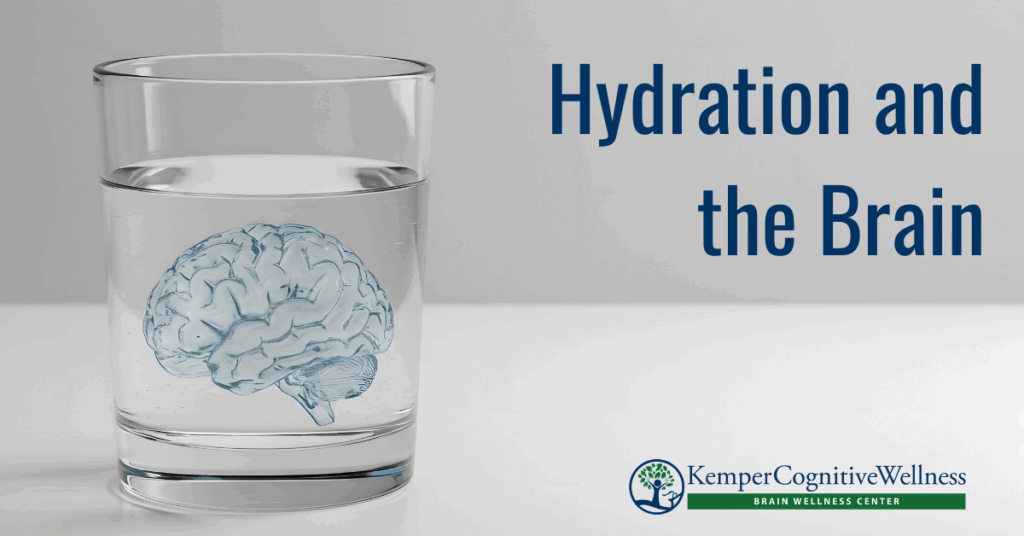Founded by my mother, Betty Kemper, RN, and me, Kemper House is a residential care facility for those living with Alzheimer’s disease and other forms of dementia. The first Kemper House facility opened in 1999, and right from the start, we did two things that were unique in the industry at the time: We kept our residents with dementia in a residential assisted living setting through all stages of the disease until they passed away. At the time, it was common practice to move them to a nursing facility when they could no longer walk, bear weight, or feed themselves. We also started an adult day program for those living with dementia who were not quite ready to move into a facility, but their caregiver worked or needed a break.
For us, this journey is personal. My grandmother was diagnosed with Alzheimer’s disease back in the 1980s. When we explored her medical history, we realized that both of my dad’s grandfathers died in psychiatric units with “hardening of the arteries,” an early term for dementia. This meant that the disease was likely to be prevalent in our family’s medical history.
In 2012, my father, John, was diagnosed with Alzheimer’s disease. At the time, we did not think there was anything that could be done to stop the disease from progressing, and that notion was confirmed by his doctors. It was suggested that we take John home, get his affairs in order, and enjoy the time he had left.
This did not sit well with us. With five children in our family, we wondered which one of us would be next.
In 2017, The End of Alzheimer’s, written by Dale Bredesen, MD, was published, and that was a game changer. In the book, Bredeson detailed what he believed were the three main drivers of dementia: inflammation, toxicity, and atrophy. The book gave ways to push back against the progressive disease and even prevent the development of some dementias such as Alzheimer’s.
Kemper House’s mission statement from 1999 reads, “Kemper House is a way of caring for memory-impaired older adults through residential long term care. The mission of Kemper House is to significantly advance the methods and practices of long term dementia care. The community of Kemper House is bound together by a passion to create a life for our residents, families, and employees, which affirms the innate dignity of persons, fosters the innovative expression of compassion, and pursues the infinite worth of each moment.”
We knew that we controlled so much of what our residents did and ate every day. In 2018, with the blessing of our Kemper House family members, we removed many of the inflammatory agents from our residents’ diets at one of our facilities to see if this would have an impact on quality of life. By reducing the use of refined sugars and grains, dairy, and processed foods, we saw many of our residents living better. We found that we were able to reduce medications and insulin dependence in many of our residents, and we also saw a reduction in the use of laxatives and PRN pain medication. In addition, we noticed some of our residents had better deaths, meaning their dying period was shorter, with less restlessness and medication.
Cognitive Wellness and Brain Reablement
In 2018, we founded The Kemper Center for Cognitive Health and Wellness. Working with Dr. Nate Bergman, an integrative medicine physician, Kemper Cognitive Wellness began testing clients, families, and even some Kemper House residents whose families requested it, to try to determine the root causes of their symptoms. My dad was the first person we tested. Not only did he have one copy of the APOE4 Alzheimer’s gene, but he also had a number of other risk factors, including high blood pressure, type 2 diabetes, and high levels of metals in his bloodstream. It was interesting to note that over half of the residents we tested did not have a copy of the APOE4 gene, which indicated to us that there were other factors contributing to their dementia.
In 2021, we developed our BrainFit® program. BrainFit® is a reablement program aimed at recovering lost cognitive abilities and improving memory and aspects of brain function required to become and stay more independent for as long as possible. BrainFit® incorporates many of the pillars of wellness, along with evidence-informed interventions that promote neurogenesis, or the ability to grow new brain cells and enhance cognition. Cognitive training, noninvasive neurotechnologies, coordinated movement, and physical activity—all designed to steadily help participants improve their memory and other abilities—are cornerstones of the BrainFit® experience.
A proof-of-concept program of BrainFit® was conducted in 2021 with a small group of residents. We found that residents who participated improved get-up-and-go, gait speed, and mini-mental state examination (MMSE) scores, in addition to realizing positive changes in range of motion, memory, engagement, language and conversation ability, self-care, and mood.
To say the program has been a success is an understatement. In the three years the program has been running, our data demonstrates that we are able to improve participants’ Montreal Cognitive Assessment (MoCA) scores. When a person is diagnosed with mild cognitive impairment (a precursor to Alzheimer’s or dementia), that person’s MoCA score decreases on average by 2.39 points per year. Our participants in the BrainFit® program improved their MoCA scores by .25 point on average per year.
A Focus on Cognitive Care
As people progress in their disease journey, the symptoms of Alzheimer’s and dementia are generally different from any other chronic disease or illness associated with aging. Often, people with dementia experience symptoms such as difficulty communicating, lack of safety awareness, behavioral disturbances, wandering, and inability to regulate their mood and emotions. Many aging residents who do not have dementia will not tolerate residents who do, and likewise, many caregivers find it especially difficult to work with the dementia population. Our experience has proven that a singular focus on memory care is immensely beneficial to people living with Alzheimer’s and other forms of dementia.
We now know there is a great need for general cognitive care, as well. People don’t just wake up one day with dementia; it is a degenerative disease that starts 10 to 20 years before any symptoms appear. General cognitive care can be the precursor to dementia care, and it is what we offer at Kemper Cognitive Wellness to help people find and treat the root causes of disease. We strive to prevent progression.
We also know from research and through our own experience and results that there are many things you can do to slow and potentially reverse cognitive decline. The earlier you get tested, the more you can do to slow the progression of the disease. If you received a cancer diagnosis, you would take immediate action to better your chances of recovery. The same approach and dedication to pushing back against the disease needs to happen with cognitive issues.
The Role of Lifestyle Habits
Lifestyle habits have a significant impact on your risk of developing dementia. Diet, sleep, exercise, stress, loneliness, and exposure to toxins all can contribute to your cognitive health and are often interconnected. The good news is these are factors people can control, and it is never too late to make changes.
A lesser-known risk factor in developing dementia is the exposure to toxins, such as mold, lawn chemicals, and plastics. Reducing exposure to environmental toxins to prevent build-up in your body will also benefit your cognitive health.
Supporting the Family
When a family member or loved one is diagnosed with Alzheimer’s or dementia, navigating a path forward can be overwhelming and difficult. To help families, Kemper House provides comprehensive support through multiple resources and programs. We offer a new family orientation that helps families prepare for positive visits and supports the transition to memory care. Ongoing assistance is available through support groups, and, if requested, dementia family coaching is provided in collaboration with Kemper Cognitive Wellness.
One of the standout educational events we host twice a year is the virtual dementia tour program. With the use of technology, families and staff gain firsthand experience of what living with dementia might feel like, fostering deeper empathy and understanding. For those seeking a private approach to support and understanding, Kemper House offers a Live Well With Dementia online course through Kemper Cognitive Wellness.
Being Proactive with Cognitive Health
The more information that can be provided to the public about Alzheimer’s, and the more the public understands, the better the chances of eliminating the stigma associated with dementia and, hopefully, leading people to be proactive in improving their cognitive health.
Currently, Kemper Cognitive Wellness is one of only six sites in the country chosen to conduct the Evanthea Dementia Reversal Trial. This is a unique opportunity to potentially improve mild cognitive impairment or early-stage dementia. It’s not a drug trial but a precision medicine approach, which means every participant is treated specifically based on individual test results. We are incredibly encouraged by the outcomes and are looking forward to sharing the results.
Kristin Kemper West, LNHA, is owner/operator of Kemper House in Ohio.





